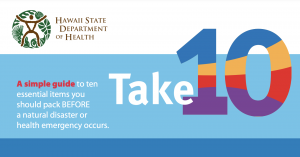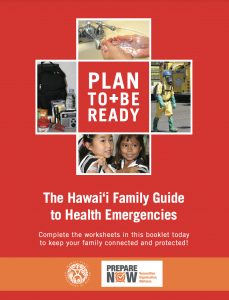Flooding
Hurricanes and storms can bring heavy rain to Hawaii, causing flooding and dangerous surf. In canyons and valleys, sudden rain can bring flash flooding and landslides. It is important to understand the danger that this brings and what you can do to protect your family:
-
- Stay out of flood waters during and after heavy rain. So-called “brown water” may contain pathogens and hazardous materials and may have potential hazards hidden beneath flood waters. People with open wounds in particular are vulnerable to illness, such as tetanus, a painful and sometimes deadly illness caused by bacteria found throughout the environment. Tetanus vaccination is recommended for everyone throughout their life, but a shot may be needed following a wound or burn. More information on tetanus and tetanus vaccination can be found at CDC’s tetanus page.
- Do not be a “spectator” during a heavy storm. Wind and rain from hurricanes and tropical storms can carry debris at high speed, which can cause injury or death if it strikes a person. Dangerous surf can sweep people away from beaches.
- Turn around, don’t drown. Do not drive through flood waters. Fast moving water that is only six inches to a foot in depth can carry a car away. The flood waters may also be hiding potential hazards.
- If your home is flooded or damaged by torrential rain, or during a disaster, it is important that you take action to clean up your home and belongings to prevent mold and other health problems. CDC has information how to safely and effectively clean up your flooded or water-damaged home at their Guidelines for Cleaning Safely After a Disaster page.
Know what to do
Everyone should know what to do to in extreme wet weather. The Centers for Disease Control & Prevention (CDC), the Federal Emergency Management Agency (FEMA), and the US Geological Survey (USGS) have excellent resources to help you learn what you need to do. For more information, click on the links below.
Make sure your family is prepared
Flooding, storm surge, and other rain-related events can damage infrastructure and even leave some neighborhoods isolated, leaving people without power, water, or other utilities. Everyone in Hawaii should prepare a family emergency kit that includes at least 14 days of food, water, medicine, and other essentials. It is also important to have a family emergency plan. You can use the helpful guides below to learn more:
Last reviewed December 2021



